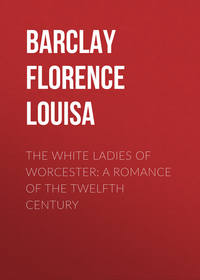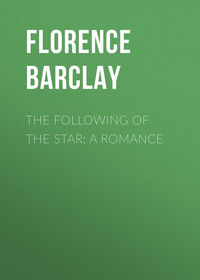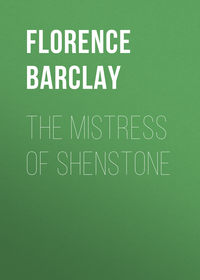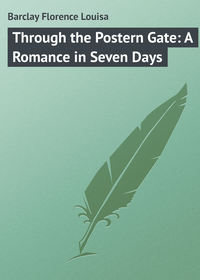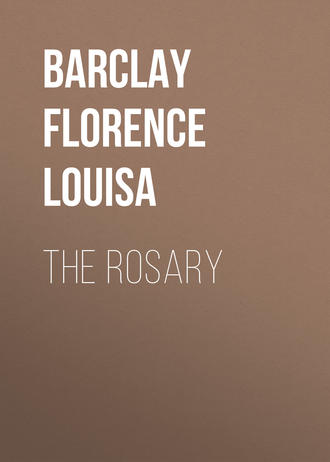 полная версия
полная версияThe Rosary
"Well, at Overdene we used to play a silly game at dessert with muscatels. We each put five raisins at intervals round our plates, then we shut our eyes and made jabs at them with forks. Whoever succeeded first in spiking and eating all five was the winner. The duchess never would play. She enjoyed being umpire, and screaming at the people who peeped. Miss Champion and I—she is the duchess's niece, you know—always played fair, and we nearly always made a dead heat of it."
"Yes," said Nurse Rosemary, "I know that game. I thought of it at once when I had my blindfold meals."
"Ah," cried Garth, "had I known, I would not have let you do it!"
"I knew that," said Nurse Rosemary. "That was why I week-ended."
Garth passed his cup to be refilled, and leaned forward confidentially.
"Now," he said, "I can venture to tell you one of my minor trials. I am always so awfully afraid of there being a FLY in things. Ever since I was a small boy I have had such a horror of inadvertently eating flies. When I was about six, I heard a lady visitor say to my mother: 'Oh, one HAS to swallow a fly—about once a year! I have just swallowed mine, on the way here!' This terrible idea of an annual fly took possession of my small mind. I used to be thankful when it happened, and I got it over. I remember quickly finishing a bit of bread in which I had seen signs of legs and wings, feeling it was an easy way of taking it and I should thus be exempt for twelve glad months; but I had to run up and down the terrace with clenched hands while I swallowed it. And when I discovered the fallacy of the annual fly, I was just as particular in my dread of an accidental one. I don't believe I ever sat down to sardines on toast at a restaurant without looking under the toast for my bugbear, though as I lifted it I felt rather like the old woman who always looks under the bed for a burglar. Ah, but since the accident this foolishly small thing HAS made me suffer! I cannot say: 'Simpson, are you sure there is not a fly in this soup?' Simpson would say: 'No—sir; no fly—sir,' and would cough behind his hand, and I could never ask him again."
Nurse Rosemary leaned forward and placed his cup where he could reach it easily, just touching his right hand with the edge of the saucer. "Have all your meals with me," she said, in a tone of such complete understanding, that it was almost a caress; "and I can promise there shall never be any flies in anything. Could you not trust my eyes for this?"
And Garth replied, with a happy, grateful smile: "I could trust your kind and faithful eyes for anything. Ah! and that reminds me: I want to intrust to them a task I could confide to no one else. Is it twilight yet, Miss Gray, or is an hour of daylight left to us?"
Nurse Rosemary glanced out of the window and looked at her watch. "We ordered tea early," she said, "because we came in from our drive quite hungry. It is not five o'clock yet, and a radiant afternoon. The sun sets at half-past seven."
"Then the light is good," said Garth. "Have you finished tea? The sun will be shining in at the west window of the studio. You know my studio at the top of the house? You fetched the studies of Lady Brand from there. I dare say you noticed stacks of canvases in the corners. Some are unused; some contain mere sketches or studies; some are finished pictures. Miss Gray, among the latter are two which I am most anxious to identify and to destroy. I made Simpson guide me up the other day and leave me there alone. And I tried to find them by touch; but I could not be sure, and I soon grew hopelessly confused amongst all the canvases. I did not wish to ask Simpson's help, because the subjects, are—well, somewhat unusual, and if he found out I had destroyed them it might set him wondering and talking, and one hates to awaken curiosity in a servant. I could not fall back on Sir Deryck because he would have recognised the portraits. The principal figure is known to him. When I painted those pictures I never dreamed of any eye but my own seeing them. So you, my dear and trusted secretary, are the one person to whom I can turn. Will you do what I ask? And will you do it now?"
Nurse Rosemary pushed back her chair. "Why of course, Mr. Dalmain. I am here to do anything and everything you may desire; and to do it when you desire it."
Garth took a key from his waistcoat pocket, and laid it on the table. "There is the studio latch-key. I think the canvases I want are in the corner furthest from the door, behind a yellow Japanese screen. They are large—five feet by three and a half. If they are too cumbersome for you to bring down, lay them face to face, and ring for Simpson. But do not leave him alone with them."
Nurse Rosemary picked up the key, rose, and went over to the piano, which she opened. Then she tightened the purple cord, which guided Garth from his chair to the instrument.
"Sit and play," she said, "while I am upstairs, doing your commission. But just tell me one thing. You know how greatly your work interests me. When I find the pictures, is it your wish that I give them a mere cursory glance, just sufficient for identification; or may I look at them, in the beautiful studio light? You can trust me to do whichever you desire."
The artist in Garth could not resist the wish to have his work seen and appreciated. "You may look at them of course, if you wish," he sail. "They are quite the best work I ever did, though I painted them wholly from memory. That is—I mean, that used to be—a knack of mine. And they are in no sense imaginary. I painted exactly what I saw—at least, so far as the female face and figure are concerned. And they make the pictures. The others are mere accessories." He stood up, and went to the piano. His fingers began to stray softly amongst the harmonies of the Veni.
Nurse Rosemary moved towards the door. "How shall I know them?" she asked, and waited.
The chords of the Veni hushed to a murmur, Garth's voice from the piano came clear and distinct, but blending with the harmonies as if he were reciting to music.
"A woman and a man … alone, in a garden—but the surroundings are only indicated. She is in evening dress; soft, black, and trailing; with lace at her breast. It is called: 'The Wife.'"
"Yes?"
"The same woman; the same scene; but without the man, this time. No need to paint the man; for now—visible or invisible—to her, he is always there. In her arms she holds"—the low murmur of chords ceased; there was perfect silence in the room-"a little child. It is called: 'The Mother.'"
The Veni burst forth in an unrestrained upbearing of confident petition:
"Keep far our foes; give peace at home"—and the door closed behind Nurse Rosemary.
CHAPTER XXVIII
IN THE STUDIO
Jane mounted to the studio; unlocked the door, and, entering, closed it after her.
The evening sun shone through a western window, imparting an added richness to the silk screens and hangings; the mauve wistaria of a Japanese embroidery; or the golden dragon of China on a deep purple ground, wound up in its own interminable tail, and showing rampant claws in unexpected places.
Several times already Jane had been into Garth's studio, but always to fetch something for which he waited eagerly below; and she had never felt free to linger. Margery had a duplicate key; for she herself went up every day to open the windows, dust tenderly all special treasures; and keep it exactly as its owner had liked it kept, when his quick eyes could look around it. But this key was always on Margery's bunch; and Jane did not like to ask admission, and risk a possible refusal.
Now, however, she could take her own time; and she seated herself in one of the low and very deep wicker lounge-chairs, comfortably upholstered; so exactly fitting her proportions, and supporting arms, knees, and head, just rightly, that it seemed as if all other chairs would in future appear inadequate, owing to the absolute perfection of this one. Ah, to be just that to her beloved! To so fully meet his need, at every point, that her presence should be to him always a source of strength, and rest, and consolation.
She looked around the room. It was so like Garth; every detail perfect; every shade of colour enhancing another, and being enhanced by it. The arrangements for regulating the light, both from roof and windows; the easels of all kinds and sizes; clean bareness, where space, and freedom from dust, were required; the luxurious comfort round the fireplace, and in nooks and corners; all were so perfect. And the plain brown wall-paper, of that beautiful quiet shade which has in it no red, and no yellow; a clear nut-brown. On an easel near the further window stood an unfinished painting; palette and brushes beside it, just as Garth had left them when he went out on that morning, nearly three months ago; and, vaulting over a gate to protect a little animal from unnecessary pain, was plunged himself into such utter loss and anguish.
Jane rose, and took stock of all his quaint treasures on the mantelpiece. Especially her mind was held and fascinated by a stout little bear in brass, sitting solidly yet jauntily on its haunches, its front paws clasping a brazen pole; its head turned sideways; its small, beady, eyes, looking straight before it. The chain, from its neck to the pole denoted captivity and possible fierceness. Jane had no doubt its head would lift, and its body prove a receptacle for matches; but she felt equally certain that, should she lift its head and look, no matches would be within it. This little bear was unmistakably Early Victorian; a friend of childhood's days; and would not be put to common uses. She lifted the head. The body was empty. She replaced it gently on the mantelpiece, and realised that she was deliberately postponing an ordeal which must be faced.
Deryck had told her of Garth's pictures of the One Woman. Garth, himself, had now told her even more. But the time had come when she must see them for herself. It was useless to postpone the moment. She looked towards the yellow screen.
Then she walked, over to the western window, and threw it wide open. The sun was dipping gently towards the purple hills. The deep blue of the sky began to pale, as a hint of lovely rose crept into it. Jane looked heavenward and, thrusting her hands deeply into her pockets, spoke aloud. "Before God" she said,—"in case I am never able to say or think it again, I will say it now—I BELIEVE I WAS RIGHT. I considered Garth's future happiness, and I considered my own. I decided as I did for both our sakes, at terrible cost to present joy. But, before God, I believed I was right; and—I BELIEVE IT STILL."
Jane never said it again.
CHAPTER XXIX
JANE LOOKS INTO LOVE'S MIRROR
Behind the yellow screen, Jane found a great confusion of canvases, and unmistakable evidence of the blind hands which had groped about in a vain search, and then made fruitless endeavours to sort and rearrange. Very tenderly, Jane picked up each canvas from the fallen heap; turning it the right way up, and standing it with its face to the wall. Beautiful work, was there; some of it finished; some, incomplete. One or two faces she knew, looked out at her in their pictured loveliness. But the canvases she sought were not there.
She straightened herself, and looked around. In a further corner, partly concealed by a Cairo screen, stood another pile. Jane went to them.
Almost immediately she found the two she wanted; larger than the rest, and distinguishable at a glance by the soft black gown of the central figure.
Without giving them more than a passing look, she carried them over to the western window, and placed them in a good light. Then she drew up the chair in which she had been sitting; took the little brass bear in her left hand, as a talisman to help her through what lay before her; turned the second picture with its face to the easel; and sat down to the quiet contemplation of the first.
The noble figure of a woman, nobly painted, was the first impression which leapt from eye to brain. Yes, nobility came first, in stately pose, in uplifted brow, in breadth of dignity. Then—as you marked the grandly massive figure, too well-proportioned to be cumbersome, but large and full, and amply developed; the length of limb; the firmly planted feet; the large capable hands,—you realised the second impression conveyed by the picture, to be strength;—strength to do; strength to be; strength to continue. Then you looked into the face. And there you were confronted with a great surprise. The third thought expressed by the picture was Love—love, of the highest, holiest, most ideal, kind; yet, withal, of the most tenderly human order; and you found it in that face.
It was a large face, well proportioned to the figure. It had no pretensions whatever to ordinary beauty. The features were good; there was not an ugly line about them; and yet, each one just missed the beautiful; and the general effect was of a good-looking plainness; unadorned, unconcealed, and unashamed. But the longer you looked, the more desirable grew the face; the less you noticed its negations; the more you admired its honesty, its purity, its immense strength of purpose; its noble simplicity. You took in all these outward details; you looked away for a moment, to consider them; you looked back to verify them; and then the miracle happened. Into the face had stolen the "light that never was on sea or land." It shone from the quiet grey eyes,—as, over the head of the man who knelt before her, they looked out of the picture—with an expression of the sublime surrender of a woman's whole soul to an emotion which, though it sways and masters her, yet gives her the power to be more truly herself than ever before. The startled joy in them; the marvel at a mystery not yet understood; the passionate tenderness; and yet the almost divine compassion for the unrestrained violence of feeling, which had flung the man to his knees, and driven him to the haven of her breast; the yearning to soothe, and give, and content;—all these were blended into a look of such exquisite sweetness, that it brought tears to the eyes of the beholder.
The woman was seated on a broad marble parapet. She looked straight before her. Her knees came well forward, and the long curve of the train of her black gown filled the foreground on the right. On the left, slightly to one side of her, knelt a man, a tall slight figure in evening dress, his arms thrown forward around her waist; his face completely hidden in the soft lace at her bosom; only the back of his sleek dark head, visible. And yet the whole figure denoted a passion of tense emotion. She had gathered him to her with what you knew must have been an exquisite gesture, combining the utter self-surrender of the woman, with the tender throb of maternal solicitude; and now her hands were clasped behind his head, holding him closely to her. Not a word was being spoken. The hidden face was obviously silent; and her firm lips above his dark head were folded in a line of calm self-control; though about them hovered the dawning of a smile of bliss ineffable.
A crimson rambler rose climbing some woodwork faintly indicated on the left, and hanging in a glowing mass from the top left-hand corner, supplied the only vivid colour in the picture.
But, from taking in these minor details, the eye returned to that calm tender face, alight with love; to those strong capable hands, now learning for the first time to put forth the protective passion of a woman's tenderness; and the mind whispered the only possible name for that picture: The Wife.
Jane gazed at it long, in silence. Had Garth's little bear been anything less solid than Early Victorian brass; it must have bent and broken under the strong pressure of those clenched hands.
She could not doubt, for a moment, that she looked upon herself; but, oh, merciful heavens! how unlike the reflected self of her own mirror! Once or twice as she looked, her mind refused to work, and she simply gazed blankly at the minor details of the picture. But then again, the expression of the grey eyes drew her, recalling so vividly every feeling she had experienced when that dear head had come so unexpectedly to its resting-place upon her bosom. "It is true," she whispered; and again: "Yes; it is true. I cannot deny it. It is as I felt; it must be as I looked."
And then, suddenly; she fell upon her knees before the picture. "Oh, my God! Is that as I looked? And the next thing that happened was my boy lifting his shining eyes and gazing at me in the moonlight. Is THIS what he saw? Did I look SO? And did the woman who looked so; and who, looking so, pressed his head down again upon her breast, refuse next day to marry him, on the grounds of his youth, and her superiority?… Oh, Garth, Garth! … O God, help him to understand! … help him to forgive me!"
In the work-room just below, Maggie the housemaid was singing as she sewed. The sound floated through the open window, each syllable distinct in the clear Scotch voice, and reached Jane where she knelt. Her mind, stunned to blankness by its pain, took eager hold upon the words of Maggie's hymn. And they were these.
"O Love, that will not let me go,I rest my weary soul in Thee;I give Thee back the life I owe,That in Thine ocean depths its flowMay richer, fuller be.""O Light, that followest all my way,I yield my flick'ring torch to Thee;My heart restores its borrowed ray,That in Thy sunshine's blaze its dayMay brighter, fairer be."Jane took the second picture, and placed it in front of the first.
The same woman, seated as before; but the man was not there; and in her arms, its tiny dark head pillowed against the fulness of her breast, lay a little child. The woman did not look over that small head, but bent above it, and gazed into the baby face.
The crimson rambler had grown right across the picture, and formed a glowing arch above mother and child. A majesty of tenderness was in the large figure of the mother. The face, as regarded contour and features, was no less plain; but again it was transfigured, by the mother-love thereon depicted. You knew "The Wife" had more than fulfilled her abundant promise. The wife was there in fullest realisation; and, added to wifehood, the wonder of motherhood. All mysteries were explained; all joys experienced; and the smile on her calm lips, bespoke ineffable content.
A rambler rose had burst above them, and fallen in a shower of crimson petals upon mother and child. The baby-fingers clasped tightly the soft lace at her bosom. A petal had fallen upon the tiny wrist. She had lifted her hand to remove it; and, catching the baby-eyes, so dark and shining, paused for a moment, and smiled.
Jane, watching them, fell to desperate weeping. The "mere boy" had understood her potential possibilities of motherhood far better than she understood them herself. Having had one glimpse of her as "The Wife," his mind had leaped on, and seen her as "The Mother." And again she was forced to say: "It is true—yes; it is true."
And then she recalled the old line of cruel reasoning:
"It was not the sort of face one would have wanted to see always in front of one at table." Was this the sort of face—this, as Garth had painted it, after a supposed year of marriage? Would any man weary of it, or wish to turn away his eyes?
Jane took one more long look. Then she dropped the little bear, and buried her face in her hands; while a hot blush crept up to the very roots of her hair, and tingled to her finger-tips.
Below, the fresh young voice was singing again.
"O Joy, that seekest me through pain,I cannot close my heart to Thee;I trace the rainbow through the rain,And feel the promise is not vainThat morn shall tearless be."After a while Jane whispered: "Oh, my darling, forgive me. I was altogether wrong. I will confess; and, God helping me, I will explain; and, oh, my darling, you will forgive me?"
Once more she lifted her head and looked at the picture. A few stray petals of the crimson rambler lay upon the ground; reminding her of those crushed roses, which, falling from her breast, lay scattered on the terrace at Shenstone, emblem of the joyous hopes and glory of love which her decision of that night had laid in the dust of disillusion. But crowning this picture, in rich clusters of abundant bloom, grew the rambler rose. And through the open window came the final verse of Maggie's hymn.
"O Cross, that liftest up my head,I dare not ask to fly from Thee;I lay in dust life's glory dead,And from the ground there blossoms redLife that shall endless be."Jane went to the western window, and stood, with her arms stretched above her, looking out upon the radiance of the sunset. The sky blazed into gold and crimson at the horizon; gradually as the eye lifted, paling to primrose, flecked with rosy clouds; and, overhead, deep blue—fathomless, boundless, blue.
Jane gazed at the golden battlements above the purple hills, and repeated, half aloud: "And the city was of pure gold;—and had no need of the sun, neither of the moon to shine in it: for the glory of God did lighten it. And there shall be no more death; neither sorrow, nor crying, neither shall there be any more pain: for the former things are passed away."
Ah, how much had passed away since she stood at that western window, not an hour before. All life seemed readjusted; its outlook altered; its perspective changed. Truly Garth had "gone behind his blindness."
Jane raised her eyes to the blue; and a smile of unspeakable anticipation parted her lips. "Life, that shall endless be," she murmured. Then, turning, found the little bear, and restored him to his place upon the mantelpiece; put back the chair; closed the western window; and, picking up the two canvases, left the studio, and made her way carefully downstairs.
CHAPTER XXX
"THE LADY PORTRAYED"
"It has taken you long, Miss Gray. I nearly sent Simpson up, to find out what had happened."
"I am glad you did not do that, Mr. Dalmain. Simpson would have found me weeping on the studio floor; and to ask his assistance under those circumstances, would have been more humbling than inquiring after the fly in the soup!"
Garth turned quickly in his chair. The artist-ear had caught the tone which meant comprehension of his work.
"Weeping!" he said. "Why?"
"Because," answered Nurse Rosemary, "I have been entranced. These pictures are so exquisite. They stir one's deepest depths. And yet they are so pathetic—ah, SO pathetic; because you have made a plain woman, beautiful."
Garth rose to his feet, and turned upon her a face which would have blazed, had it not been sightless.
"A WHAT?" he exclaimed.
"A plain woman," repeated Nurse Rosemary, quietly. "Surely you realised your model to be that. And therein lies the wonder of the pictures. You have so beautified her by wifehood, and glorified her by motherhood, that the longer one looks the more one forgets her plainness; seeing her as loving and loved; lovable, and therefore lovely. It is a triumph of art."
Garth sat down, his hands clasped before him.
"It is a triumph of truth," he said. "I painted what I saw."
"You painted her soul," said Nurse Rosemary, "and it illuminated her plain face."
"I SAW her soul," said Garth, almost in a whisper; "and that vision was so radiant that it illumined my dark life. The remembrance lightens my darkness, even now."
A very tender silence fell in the library.
The twilight deepened.
Then Nurse Rosemary spoke, very low. "Mr. Dalmain, I have a request to make of you. I want to beg you not to destroy these pictures."
Garth lifted his head. "I must destroy them, child," he said. "I cannot risk their being seen by people who would recognise my—the—the lady portrayed."
"At all events, there is one person who must see them, before they are destroyed."
"And that is?" queried Garth.
"The lady portrayed," said Nurse Rosemary, bravely.
"How do you know she has not seen them?"
"Has she?" inquired Nurse Rosemary.
"No," said Garth, shortly; "and she never will."
"She must."
Something in the tone of quiet insistence struck Garth.
"Why?" he asked; and listened with interest for the answer.
"Because of all it would mean to a woman who knows herself plain, to see herself thus beautified."
Garth sat very still for a few moments. Then: "A woman who—knows—herself—plain?" he repeated, with interrogative amazement in his voice.


